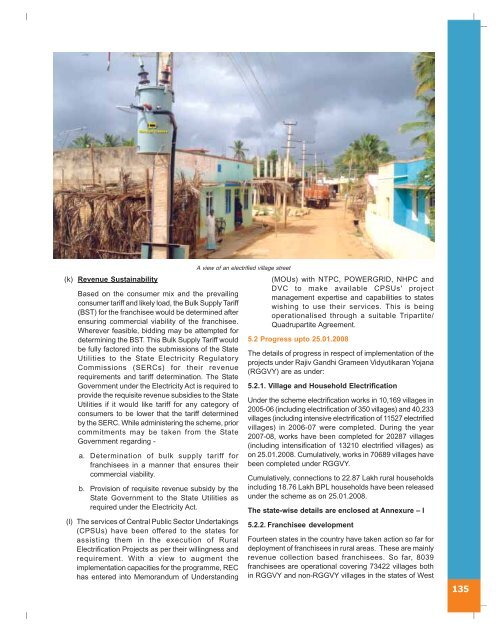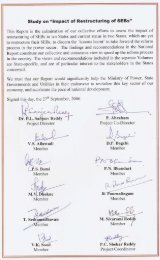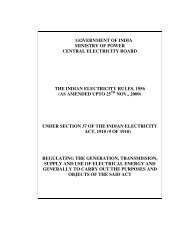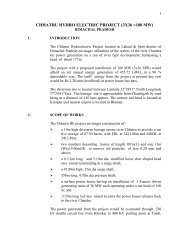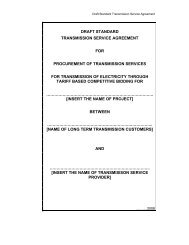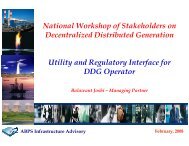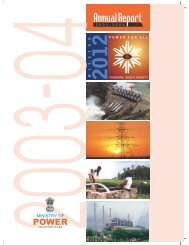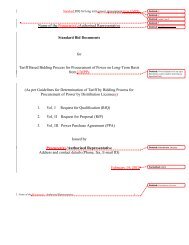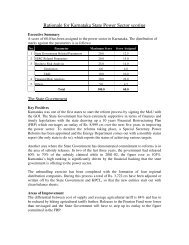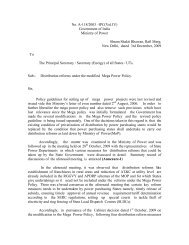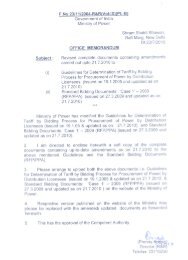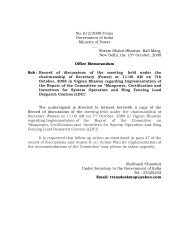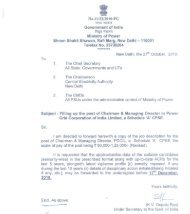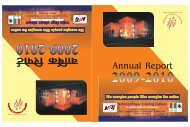MoP - Ministry of Power
MoP - Ministry of Power
MoP - Ministry of Power
Create successful ePaper yourself
Turn your PDF publications into a flip-book with our unique Google optimized e-Paper software.
(k) Revenue Sustainability<br />
Based on the consumer mix and the prevailing<br />
consumer tariff and likely load, the Bulk Supply Tariff<br />
(BST) for the franchisee would be determined after<br />
ensuring commercial viability <strong>of</strong> the franchisee.<br />
Wherever feasible, bidding may be attempted for<br />
determining the BST. This Bulk Supply Tariff would<br />
be fully factored into the submissions <strong>of</strong> the State<br />
Utilities to the State Electricity Regulatory<br />
Commissions (SERCs) for their revenue<br />
requirements and tariff determination. The State<br />
Government under the Electricity Act is required to<br />
provide the requisite revenue subsidies to the State<br />
Utilities if it would like tariff for any category <strong>of</strong><br />
consumers to be lower that the tariff determined<br />
by the SERC. While administering the scheme, prior<br />
commitments may be taken from the State<br />
Government regarding -<br />
a. Determination <strong>of</strong> bulk supply tariff for<br />
franchisees in a manner that ensures their<br />
commercial viability.<br />
b. Provision <strong>of</strong> requisite revenue subsidy by the<br />
State Government to the State Utilities as<br />
required under the Electricity Act.<br />
(l) The services <strong>of</strong> Central Public Sector Undertakings<br />
(CPSUs) have been <strong>of</strong>fered to the states for<br />
assisting them in the execution <strong>of</strong> Rural<br />
Electrification Projects as per their willingness and<br />
requirement. With a view to augment the<br />
implementation capacities for the programme, REC<br />
has entered into Memorandum <strong>of</strong> Understanding<br />
A view <strong>of</strong> an electrified village street<br />
(MOUs) with NTPC, POWERGRlD, NHPC and<br />
DVC to make available CPSUs' project<br />
management expertise and capabilities to states<br />
wishing to use their services. This is being<br />
operationalised through a suitable Tripartite/<br />
Quadrupartite Agreement.<br />
5.2 Progress upto 25.01.2008<br />
The details <strong>of</strong> progress in respect <strong>of</strong> implementation <strong>of</strong> the<br />
projects under Rajiv Gandhi Grameen Vidyutikaran Yojana<br />
(RGGVY) are as under:<br />
5.2.1. Village and Household Electrification<br />
Under the scheme electrification works in 10,169 villages in<br />
2005-06 (including electrification <strong>of</strong> 350 villages) and 40,233<br />
villages (including intensive electrification <strong>of</strong> 11527 electrified<br />
villages) in 2006-07 were completed. During the year<br />
2007-08, works have been completed for 20287 villages<br />
(including intensification <strong>of</strong> 13210 electrified villages) as<br />
on 25.01.2008. Cumulatively, works in 70689 villages have<br />
been completed under RGGVY.<br />
Cumulatively, connections to 22.87 Lakh rural households<br />
including 18.76 Lakh BPL households have been released<br />
under the scheme as on 25.01.2008.<br />
The state-wise details are enclosed at Annexure – I<br />
5.2.2. Franchisee development<br />
Fourteen states in the country have taken action so far for<br />
deployment <strong>of</strong> franchisees in rural areas. These are mainly<br />
revenue collection based franchisees. So far, 8039<br />
franchisees are operational covering 73422 villages both<br />
in RGGVY and non-RGGVY villages in the states <strong>of</strong> West<br />
135


